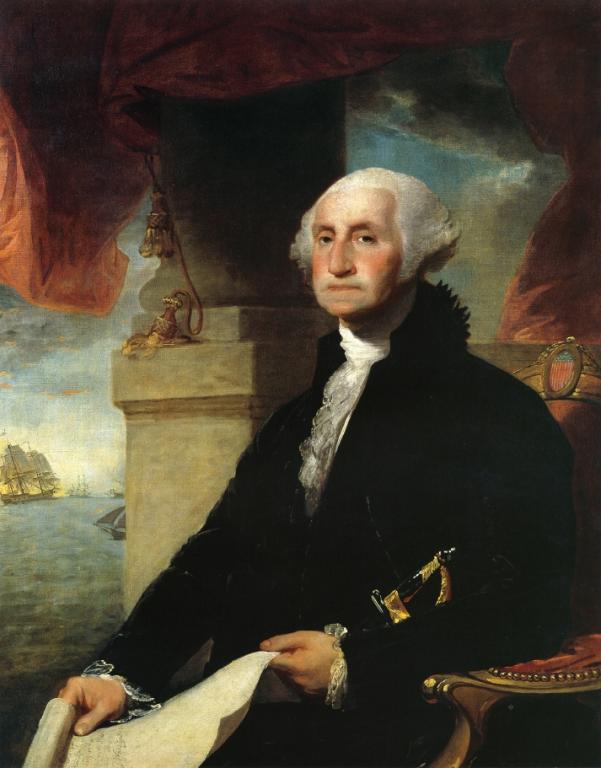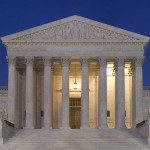
Our stake put on a patriotic fireside tonight, complete with the stake choir, a brief vocal solo by a young woman, a violinist, a pianist, a flautist, and an organist. A reader recited quotations from some of the Founding Fathers (e.g., Thomas Paine, Patrick Henry, John Adams, George Washington, and Benjamin Franklin) and our founding documents (the Declaration of Independence and the Preamble to the Constitution). There was also a second reader toward the end. I was the narrator.
The program went well. Punctuated with choral and congregational singing, it very briefly summarized the history of America from the days of the Pilgrims through the colonies, the Articles of Association in 1774, Lexington and Concord and “the shot heard round the world” in 1775, the Declaration of Independence in 1776, and the ratification of the Constitution of the United States in 1788.
Some of the material that I was given to read went as follows:
America. It was a thought, a dream, an idea that brought them. From far across the sea, they came all with one though: That a man might chart his own course; a man might seek his own destiny, pursue his own dream. And the dream was like fire in their souls — and so they came to this unknown land.
Early travelers to America were known as pilgrims. As time passed, others, known as colonists, also came in search of freedom. . . .
They were well educated in how government worked and they knew that the only way to a truly prosperous country was to give power to the people.
Many of the founding fathers spoke with a similar passion of freedom and liberty . . .
. . . the creation of a country where mankind could find expression of the inherent gifts bestowed at birth: life, liberty, and the pursuit of happiness.
It was a very good script, and I believe strongly in the ideals of America. As I looked out over the audience in the stake center, though, I couldn’t help but be acutely aware that there were at least a few people scattered among the congregation whose ancestors very probably didn’t come to America as either pilgrims or colonists, or motivated by a dream of liberty, or even of their own free will and choice.
As I say, I believe in the ideals of America. But I also know that we have often fallen short of them, and especially so in the case of chattel slavery:
We hold these truths to be self-evident, that all men are created equal, that they are endowed by their Creator with certain unalienable Rights, that among these are Life, Liberty and the pursuit of Happiness.–That to secure these rights, Governments are instituted among Men, deriving their just powers from the consent of the governed.
It took us until 1865 to rectify a gross, massive, and painfully obvious offense against that statement from our own founding charter.
“The arc of the moral universe is long,” said the American reformer, minister, and abolitionist Theodore Parker (d. 1860), “but it bends towards justice.” I hope that he’s right, even if only on average and in the long term. I like the Protestant slogan Ecclesia semper reformanda est (“the church must always be reformed”). But I also think that it applies to America as a nation and as a culture. And I think, too, of President Russell M. Nelson’s repeated insistence that the Restoration is ongoing. Neither the Church nor America arrived perfectly complete.
At its close, the script also had me introduce a wonderful quotation from Alexis de Tocqueville, the insightful early-nineteenth-century French author of Democracy in America:
I sought for the greatness and genius of America in her commodious harbors and her ample rivers, and it was not there. I sought for the greatness and genius of America in her fertile fields and boundless forests, and it was not there. I sought for the greatness and genius of America in her rich mines and her vast world commerce, and it was not there. [I sought for the greatness and genius of America in her public school system and her institutions of learning, and it was not there. I sought for the greatness and genius of America in her democratic Congress and her matchless Constitution, and it was not there.] Not until I went into the churches of America and heard her pulpits aflame with righteousness did I understand the secret of her genius and power. America is great because she is good, and if America ever ceases to be good, she will cease to be great.
I love the passage, and I think it’s absolutely true. The trouble is that, although it has been ascribed to de Tocqueville for at least a century and a half (and by multiple presidents of both parties), nobody has been able to find it in anything that he himself ever penned. So I softened the attribution.
The third reader, at the end, cited a passage from the “‘Funeral Oration on the Death of General Washington.’ Delivered, at the Request of Congress, by Major-General Henry Lee, Member of Congress from Virginia.” (Another very famous passage from it had already been quoted in the script — read by me — describing George Washington as “first in war, first in peace, and first in the hearts of his countrymen.”). The passage cited by the third reader goes as follows, at slightly greater length than he quoted. In it, General Lee, who had been extremely close to President Washington for many years, imagined what Washington’s advice to the nation might be:
Reverence religion; diffuse knowledge throughout your land; patronize the arts and sciences; let Liberty and Order be inseparable companions; control party spirit, the bane of free government; observe good faith to, and cultivate peace with all nations; shut up every avenue to foreign influence; contract rather than extend national connection; rely on yourselves only—Be American in thought and deed. Thus will you give immortality to that union, which was the constant object of my terrestrial labors: Thus will you preserve undisturbed to the latest posterity, the felicity of a people to me most dear; and thus will you supply (if my happiness is now aught to you) the only vacancy in the round of pure bliss high Heaven bestows.
“Party spirit, the bane of free government,” was an object of fear and abhorrence to the Founders. I can’t imagine that they would be pleased with its furious raging in America today.













